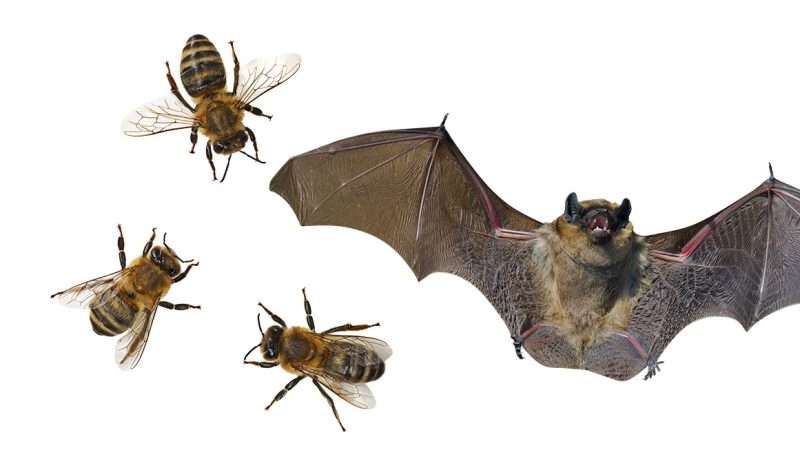
In the late 1990s, my grandfather bought a mail-order bat box as a natural approach to mosquito management. The dark green plywood roost was mounted on tall wooden poles on a sunny patch in the yard and stabilized with tension wires. The catalog promised that the bats would raise their pups inside the box and feast on the mosquitoes that swarmed my grandparents' lakefront yard.
The bat box always seemed like an undisputed win for all parties (save the mosquitoes). But when I started researching a bat box for our mosquito-plagued property in North Carolina, I learned that some off-the-shelf boxes, like the kind my grandfather used, are essentially bat ovens. In hot months, artificial roosts that are poorly located, too small, darkly painted, or insufficiently ventilated can reach lethal temperatures, killing bat pups.
This knowledge rattled me, and I suspect it would have deeply upset my grandfather, who took great pride in his environmental stewardship. But this is how science is supposed to work—hypothesize, test, share, tweak, repeat. Sometimes it's a bummer, but how else can we know if our corrective measures do what we want?
In 2021, several experts debated in the pages of Conservation Science and Practice whether it helped bats to publicize the potential lethality of a bat box. "Telling people their well-intended conservation efforts are wrong is rarely productive," wrote Virgil Brack Jr. and Dale W. Sparks, principal scientists at Environmental Solutions & Innovations, Inc. The subjects of their critique, Reed D. Crawford and Joy M. O'Keefe of the Department of Natural Resources and Environmental Sciences at the University of Illinois at Urbana-Champaign, replied that they would continue to raise awareness "that the cavalier use of unsuitable boxes could expose bats to deadly temperatures." Both parties agreed the design and deployment of artificial roosts could and should be improved. Once again, the reckoning is uncomfortable but necessary.
Amateur apiarists are rethinking a few things as well. Once considered the environmentalist equivalent of a victory garden, the European honeybee hives that were established in backyards and rooftops around the U.S. in the early 2010s following reports of "colony collapse" could "actually have a negative influence on native and wild bee populations through floral resource competition and pathogen transmission," according to research published in 2023 by conservationists at Concordia University and the University of Montreal.
"For people who say they want to save the bees and they have a honeybee hive, it's kind of like throwing Asian carp into the Great Lakes and saying you want to save the native fish," York University conservation professor Sheila Colla told The Washington Post in May 2023.
The undesirable effects of good intentions scale up pretty quickly when government policy drives environmental efforts. In August, Science reported that 2020 emissions regulations imposed by the United Nations' International Maritime Organization had the desired effect of reducing the amount of sulfur that ships released into the air, as well as the undesired effect of simultaneously reducing the volume of sulfur-based clouds, called "ship tracks," that form along shipping routes and reflect the sun away from the Earth.
"By dramatically reducing the number of ship tracks, the planet has warmed up faster," explained Science reporter Paul Voosen. "That trend is magnified in the Atlantic, where maritime traffic is particularly dense. In the shipping corridors, the increased light represents a 50% boost to the warming effect of human carbon emissions."
In China, ambitious government subsidies for green energy projects in the late 2010s spurred an explosion in electric vehicle (E.V.) development that is now readily apparent in the car graveyards around the country where obsolete E.V.s have been abandoned. "Not only are the sites an eyesore," reported Bloomberg News in 2023, but "getting rid of EVs so quickly reduces their climate benefit considering they're more emissions-intensive to build and only produce an advantage over combustion cars after a few years."
There are even policies where personal conservation and governmental environmental policy collide in a spectacularly horrifying fashion. In a September essay titled "We Thought We Were Saving the Planet, but We Were Planting a Time Bomb" in The New York Times, Canadian novelist and essayist Claire Cameron recounted her own personal reckoning with the time she spent planting trees on logging land in Ontario, only to learn years later that her efforts helped fuel forest fires.
"This was a common—if notoriously grueling—rite of passage for Canadian university students, since it allowed you to make good money while spending a few months outdoors with other like-minded young people. I was driven in part by the idealistic view that planting a tree was always going to be better than not planting one."
Except the trees they were planting were all the same species, water-thirsty and highly flammable, neatly spaced six feet apart. "Much later, I learned that the trees we were planting, black spruce, are so combustible that firefighters call them gas on a stick. The trees evolved to burn: They have flammable sap, and their resin-filled cones open up when heated to drop seeds into charred soil." To make matters more complicated still, the tree-planting program was managed by private timber companies but driven by government incentives.
For some, these unintended consequences will elicit schadenfreude; for others, despair. But there is a silver lining in these revelations, which is that we learn something new every day, month, and year about what kinds of eco-stewardship produce good results as well as what those results cost. While government bodies are not Bayesian actors, individuals and private firms can be. At the human scale, we can react and adapt to new knowledge, avoid or abandon well-meaning disasters, and make choices that have a positive impact on our local ecology.
In some cases, the best thing you can do for the environment is leave it well enough alone. Bats, it turns out, are naturally drawn to roosting in dead tree trunks. My property is full of them.
The post When Well-Intended Environmentalism Backfires appeared first on Reason.com.







